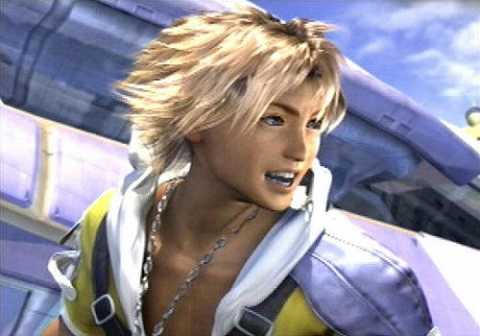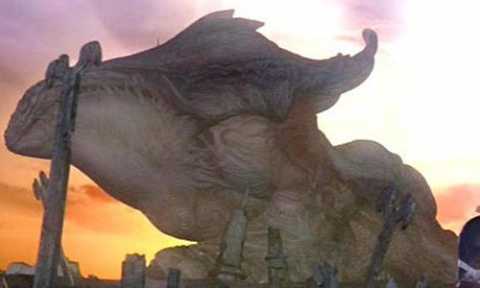Estranged Parents and Whale-Monsters: a Close Look at Final Fantasy X
By thatpinguino 46 Comments
Hey everybody, this essay is the final part of my look at the Final Fantasy series's use of broken homes and estrangement. Please take a look at my earlier work on FFVIII and FFIX if you want some other looks at how the series has handled these themes. I'm going to go into extreme depth in discussing FFX, so spoilers abound. I hope you enjoy my analysis!
---------------------------------------------------------------------------------------------------------------------------------------------------------------------------------
I cannot help but feel that it is FFX’s fusion of the personal with the apocalyptic that makes the game’s complex story so compelling. FFX follows FFVIII and FFIX in combining a world-spanning adventure with a male protagonist’s deeply personal struggle to reconnect with his father. In FFVIII, Squall completes a lengthy journey of sorceress-fighting and self-discovery, only to find that he was following in his father’s footsteps at every turn, down to falling in love with the daughter of his father’s first love. In FFIX, Zidane spends the entire game unknowingly opposing his father and brother, only to further reject them both when their familial relations are revealed. Unlike the orphaned protagonists of FFVIII and IX, there is no mystery as to who Tidus’s father is: from the beginning of FFX we know both that Tidus’s father is a blitzball player named Jecht and that Tidus hates him; yet, plenty of drama still surrounds Tidus’s relationship with his father. Once Tidus ventures to Spira it is revealed that Jecht is the monstrous creature Sin, the beast whose destruction is the main thrust of FFX’s story.

Thus, the central save-the-world plot of FFX sets Tidus on an inevitable collision course with his dad. Over the course of FFX, Tidus grows to know his absentee father by interacting with the people whom his dad affected. Tidus’s painful memories of a drunken egomaniac clash with the accounts of Jecht’s heroism that Tidus receives throughout Spira, forcing him to reconsider his appraisal of his dad. While Tidus never fully reconciles with his father, nor does he forgive Jecht for the abuse he experienced in his childhood, Tidus does gain an understanding of and respect for the father whom he never truly knew. Tidus’s image of Ject is shown to be a caricature, a distortion that amplifies Jecht’s worst qualities while hiding the rest. In addition, Tidus’s image of his father is outdated by the time he arrives in Spira; Jecht grew tremendously during his decade in Spira and Tidus’s image does not account for that growth. Through Tidus and his father Jecht, FFX demonstrates how children build their parents into larger-than-life figures, yet that initial image does not necessarily hold true over the years. Even parents still have room for growth.
Several short flashbacks offer glimpses into Tidus’s limited time with his father. These glimpses form the basis of Tidus’s understanding of who Jecht is as a person and, based on what we see, it is no surprise that Tidus hates his father. During Tidus’s trip to Luca, he remembers his father showing him a blitzball shot that he invented. Jecht says, “Well, well, trying to follow in my footsteps, are you? I usually charge for lessons, you know... That shot is done... like this… You can't do it, kid. But don't worry, my boy. You're not the only one. No one else can do it. I'm the best!” Despite Tidus trying his best to emulate his father, Jecht responds to his adolescent son by emasculating him. Where there should be teaching there is bragging. Where there should be encouragement there is shame. For Tidus, moments like these crystallize his image of his father as a bully and a braggart.
In addition to belittling Tidus with his overbearing personality, Jecht was also an alcoholic and his alcoholism threatened to ruin his blitzball career and his family. After Sin destroys the crusaders near Djose, Tidus has a flashback while chasing after Sin. In the flashback Tidus and Jecht have the following exchange:
Tidus: "They say you don't practice anymore, that you're gonna retire."Jecht: "Let them talk. I'm still the best."Tidus: "They say you're no good 'cause you drink all the time."Jecht: "I can quit drinkin' whenever I want!"Tidus: "Then do it now."Jecht: "What did you say?"Tidus: "You just said you can!"Jecht: "Heh. Tomorrow, maybe."Tidus: "Why not today?"Jecht: "Why do today what you can leave for tomorrow? There he goes again...crying!"
Though Jecht does not seem to be an especially violent or belligerent drunk, his apathy still damages a young Tidus. Tidus is confronted with his supposedly great athlete of a father wasting his gifts by drinking and lounging. Jecht cannot even lie to his child about straightening out his life. Had Jecht given Tidus some impression that he was struggling with his drinking or trying to recover his former glory, perhaps Tidus would have grown to see his father as flawed, but largely well-meaning. However, because Jecht seems to revel in his sloth and inebriation, Tidus sees him as deadbeat and a showoff who belittled his son at every opportunity.

Beyond the direct damage that Jecht inflicted on Tidus through his failings as a parent, he also dealt a bit of collateral damage when he left Zanarkand. Tidus’s mom was deeply in love with Jecht. So in love in fact, that she often ignored her son whenever her husband was around. This led Tidus to “resent him, even hate him” for stealing his mother’s attention. Once Jecht left Zanarkand, Tidus’s mom “just lost her energy” and seemed to give up on life. From Tidus’s perspective, Jecht was responsible for his mother’s unhappiness as well as his own since, as far as he knew, Jecht either abandoned him and his mother or died training (basically just another form of abandonment). Jecht couldn’t even leave without breaking something.
As a result of Jecht’s many abuses, Tidus formulated a monstrous interpretation of his father. This construct emphasized all of Jecht’s crimes at the expense of his humanity. During Titus’s time in Besaid, he has a dream that showcases his exaggerated image of his father. Tidus dreams that he is on a dock with both Yuna and Rikku, deciding which of his minor crushes he would like to pursue when big, bad dad shows up. Dream Jecht says, “You, with a woman? You can't even catch a ball! Oh, what's the matter? Gonna cry again? Cry, cry. That's the only thing you're good for!" This dream tormentor is comically petty, combining Jecht’s bullying and his go-to insult (“Gonna cry again?”), essentially saying Tidus couldn’t even get a woman in his dreams. Despite how exaggerated this version of Jecht seems, when Jecht shows up in this dream Tidus shrinks down to a child again, cowering in the face of his father. In this scene it is clear just how much repressed anger Tidus harbors towards his father, and just how much of a boogeyman Jecht is to Tidus. In making Jecht so cartoonish in this dream, the developers show how extreme Tidus’s interpretation of Jecht is. Tidus sees Jecht not as a person, but instead as a symbol of a time when he felt like a powerless child. Though Jecht was a bad father by most accounts, he certainly was not as petty as Tidus imagines.

Tidus’s issues with his father also manifest themselves in another, more dramatic fashion: Sin. The giant whale monster that terrorizes the world of Spira is Jecht…literally. After leaving Luca, Auron tells Tidus about his father: “he is no longer human. But then... I felt something of Jecht there in that shell, couldn't you? You must have felt him when you came in contact with Sin… Sin is Jecht.” Sin functions as both a central antagonist for the game and as a larger-than-life metaphor for Titus’s issues with his father. Sin is a representation of the monstrous image that Tidus harbors of his father: at Sin’s core is Jecht, but the great danger is all of the artifice around him. While Jecht is physically “no longer human” the image of Jecht that Tidus carries with him for much of the game never was. Tidus’s image of his father is based on a snapshot of Jecht from 10 years before the events of the game. By the time Tidus arrives in Spira, Jecht is no longer the man he envisioned. Jecht did a great deal of growing while on pilgrimage in Spira and Tidus’s static image of him does not consider that growth. Sin trails Tidus throughout his journey to Zanarkand, surfacing in Zanarkand, Baaj, Kilika, Djose, Macalania, and at the final encounter. In all of these encounters Tidus feels a little bit of his father inside the monster. Like Tidus’s dream version of his father, Sin is one part Jecht and a whole lot of something else. In fact, during the final encounter with Sin, there are several boss fights and full levels that occur inside of Sin before the party even encounters Jecht. Much like how Tidus has to cut through his own childish conception of who his father is to finally understand his dad in the game’s final moments, the party has to physically cut through layers of Sin to defeat Jecht.
Tidus’s static image of Ject is challenged by several different perspectives that Tidus is presented with during his pilgrimage. Thus, over the course of the game, the player is able to gradually see beyond Tidus’s prejudices about his dad. Each of these different perspectives is necessary in order to understand who Jecht really was as a person. One such perspective is Yuna’s. After being insulted by an opposing blitzball team in Luca, Tidus and Yuna have the following exchange:
Tidus: “Putting people down... They're as bad as my old man!”Yuna: "But, Sir Jecht was a kind and gentle man!"Tidus: "Well, not my Jecht."
While Tidus bristles at the mere reminder of his father, Yuna contradicts his appraisal. It is telling that Tidus replies “not my Jecht,” as it foregrounds the difference between Jecht, the man, and Tidus’s Jecht. Yuna knew a kind and gentle man who protected her father during his pilgrimage, while Tidus only knew the disappointing figure he saw in Zanarkand. In a way, Yuna’s interpretation of Jecht is the opposite extreme of Tidus’s. Yuna was also a child when she met Jecht and her interactions with him were also limited. However, Yuna formed her perception of him based upon a few positive interactions, while Tidus’s were negative. This causes Yuna to view Jecht as an honorable hero, instead of a drunken loser. Neither Titus nor Yuna’s conception of Jecht are particularly nuanced, but by seeing how different each of them feel about Jecht it is easy to see how much one’s opinion of another person can be tainted, both positively and negatively, by a handful of firsthand experiences.
Auron, Tidus’s main father figure in FFX, also complicates Tidus’s simple image of his father. Auron is the only adult that Tidus meets that had a peer relationship with Jecht, making him one of the most reliable sources on Jecht’s personality. Many of the anecdotes that Auron provides about Jecht paint a confident if naïve man with a strong moral compass (which of course also describes Tidus). One such story occurs on the Mi’ihen Highroad after the party learns of a monster roaming the road. Auron and Tidus have the following conversation:
Tidus: "A large fiend... Let's go get him!"Auron: "Why?"Tidus: "It's the right thing to do."Auron: "It's the right thing to do?"Tidus: "What'd I say now?"Auron: "Jecht said that a lot, too. And every time he said it, it meant trouble for Braska and me."
Now based on Tidus’s memories of his father “it’s the right thing to do” does not seem like something he would say at all, let alone “a lot”. However, Auron spent what was likely months journeying with Jecht during Braska’s pilgrimage. During that time, the two men bonded and grew from begrudging allies into good friends. Although Auron did not fully trust Jecht at the beginning of their journey together, he eventually grew to respect the blitzball player from Zanarkand. By the time Tidus arrives in Spira, Auron has subsumed Jecht’s fathering responsibilities. He passes down messages to Tidus that Jecht could not.
Auron: "Jecht loved you."Tidus: "Oh, come on, please!"Auron: “He just didn’t know how to express it, he said.”
Auron is able to tell Tidus about his father in ways that Jecht could not articulate himself. Jecht was kind, caring, and selfless, but he was not eloquent. Through Auron’s perspective we can see many of the positive traits that Tidus was unable to see during his time with his dad.
There is one last bit of evidence that Jecht did not stay the monster that Tidus envisioned him to be: objective recordings. Throughout the world of Spira you can find several videos that Jecht recorded during his time with Auron and Braska. In these recordings Jecht goes from a drunk in a cell and grows into the hero that Yuna remembers. Jecht quits drinking. He makes promises to go back and see his son. He stands up for the weak. Jecht even comes close to openly expressing love for his son. What seems like every key moment of Jecht’s journey is captured on these videos, or in living memories in Zanarkand. These recordings allow the player to see how similar Tidus and Jecht are in personality and action by paralleling Jecht’s videos with moments in Tidus’s own journey. For example, Jecht encounters the same monster on the Mi’ihen Highroad that Tidus does and his reaction is to defeat it, saying, “Hey, come on! It's the right thing to do! Everyone's depending on us. Besides, it's good practice.” On top of simply connecting Tidus and Jecht, these videos also allow Jecht’s unfiltered personality to shine through. He is exposed in these videos in a way that reveals a man struggling with his flaws while exhibiting his strengths at every turn: an actual, complete human being, rather than a caricature. In these few optional pieces of side content, Jecht’s full range of emotion is laid bare and you get a sense of what Tidus missed out on when Jecht left: a great father. Who knows whether Jecht would have become a great man without going to Spira, but it is clear that the Jecht that exists in FFX would have left a completely different impression than the one Tidus brings into the game. These recordings bridge the gap between Tidus’s monstrous father and the great hero Jecht that is known throughout Spira.
The very last moments of FFX see Tidus brought face to face with his father one last time. He followed his father’s footsteps for much of the game, eventually outpacing his dad (in a similar fashion to Squall in FFVIII). However, Tidus’s reunion with his father is necessarily complex. Tidus finally tells his father “I hate you,” which feels like an exorcism of Tidus’s Jecht-shaped boogeyman. Tidus is finally able to stand up to his father for all of the pain he went through as a child. Jecht is still unable to tell his son how he feels before they clash, but after Jecht is defeated, he says “That's right. You are my son, after all.” This is as close as Jecht gets to directly telling his son he loves him or that he is proud of him. Yet, he still cannot bring himself to do it. Though saying “You are my son, after all” carries some of his meaning, his inability to emotionally communicate with his son proves to be the one flaw that Jecht never overcomes. Despite Jecht’s failure, Tidus replies to his father, “You know...for the first time, I'm glad...to have you as my father.” Holding his father in his arms Tidus is able to finally see past his decade-long hate to see the tragic hero that his father had become. This all is the reconciliation that FFX provides. It is far from perfect, and the game leaves you with the sense that there are volumes of words that this father and son want to say, but don’t. Tidus and Jecht do not end the game as friends, but they do share a mutual respect and understanding that was expertly created through a world spanning adventure.
Final Fantasy X does an excellent job of showing how great an impact formative experience can have on a child. Tidus’s entire relationship with his father is framed and marred by transgressions his father carelessly committed a decade before the events of the game. Those few moments spawned Tidus’s lifelong grudge against his father and turned his father into a symbol. For Tidus, Jecht represented personal weakness, laziness, and selfishness; all of these impressions took years and tremendous life experience to overcome. The prejudices of youth are sewn deep and are difficult to uproot. However, in the decade that Tidus is separated from his father, his father grew into a much better man than the one who left Zanarkand. It just takes Tidus the entire game to realize his father’s growth. It requires a lot of craft to turn a story about fighting a giant whale-beast into a metaphor for a son reconciling with his father, but FFX does just that, and isn’t the world better for it?
All quotes were found here: http://www.gamefaqs.com/ps2/197344-final-fantasy-x/faqs/43142
